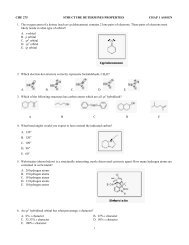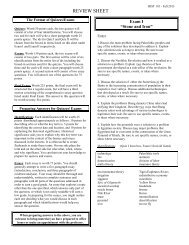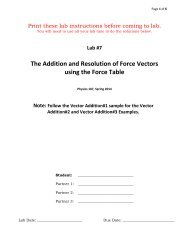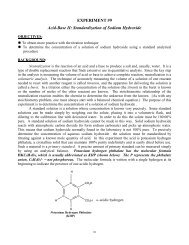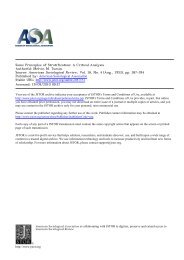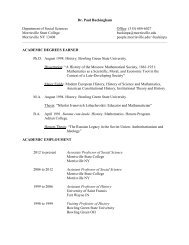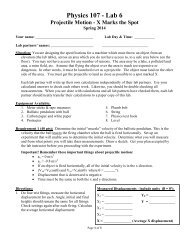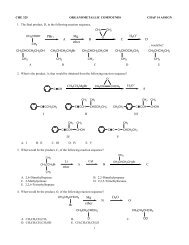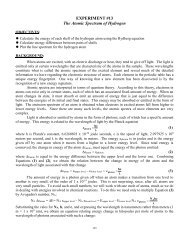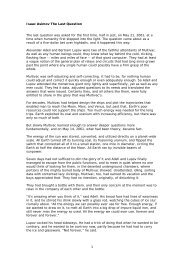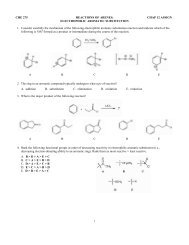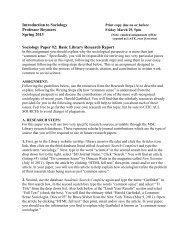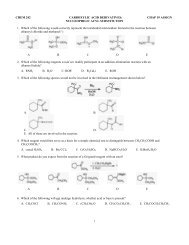Review Sheet- Exam I - Morrisville State College
Review Sheet- Exam I - Morrisville State College
Review Sheet- Exam I - Morrisville State College
You also want an ePaper? Increase the reach of your titles
YUMPU automatically turns print PDFs into web optimized ePapers that Google loves.
<strong>Exam</strong> II<br />
“Great Religious Traditions”<br />
500 B.C.E. to 1000 C.E.<br />
REVIEW SHEET<br />
Final <strong>Exam</strong><br />
“Problems in World History”<br />
500 C.E. to 1600 C.E<br />
HIST 151 - Fall 2013<br />
Essays<br />
1. Describe the role of Hindu beliefs in uniting Indian<br />
societies. Explain how either Buddhism or Jainism<br />
threatened this unity. Discuss how King Ashoka united<br />
the peoples of the Indian subcontinent by using its<br />
religious diversity. Be sure to use specific names,<br />
events, or ideas where necessary.<br />
2. Compare and contrast two of the ancient Chinese<br />
philosophies discussed. Explain how each is based<br />
upon Chinese religious beliefs and how each<br />
philosophy sought to reunite China. Be sure to use<br />
specific names, events, or ideas where necessary.<br />
3. Explain two ways the Persian Empire maintained its<br />
unity. Describe how the empire collapsed and why it<br />
collapsed so quickly. Be sure to use specific names,<br />
events, or ideas where necessary.<br />
4. Discuss how the Roman Empire used religion to hold<br />
its diverse population of conquered peoples together.<br />
Describe how Judaism challenged this and how<br />
Christianity became the unifying force in the Empire.<br />
Be sure to use specific names, events, or ideas where<br />
necessary.<br />
5. Describe two ways Islam united Arabs in the 7th<br />
Century. Explain how political conflicts caused a<br />
schism in Islam shortly after the death of Mohammed.<br />
Be sure to use specific names, events, or ideas where<br />
necessary.<br />
Key Terms (Quiz II from box, <strong>Exam</strong> II all listed)<br />
dharma/karma<br />
Siddhartha Gautama<br />
Ashoka Maurya<br />
Mandate of Heaven<br />
Legalism<br />
Zoroaster<br />
satrapies<br />
Jupiter<br />
Judaism<br />
Constantine<br />
Mohammad<br />
Caliph<br />
Mayan ball game<br />
varnas<br />
Mahavira<br />
ancestral worship<br />
Mo-tsu<br />
Kung Fuzi<br />
“King’s Eyes and Ears”<br />
Alexander the Great<br />
mystery cults<br />
St. Paul<br />
Theodosius<br />
the Five Pillars<br />
Sunni/Shi’a<br />
Mayan calendar<br />
Essays<br />
1. Discuss the nature of feudal political systems. Compare<br />
and contrast solutions developed in Medieval England and<br />
in Tokagawa Japan. to main problem in this system. Be<br />
sure to use specific names, events, or ideas where<br />
necessary.<br />
2. Discuss the role of religion in supporting the legitimacy<br />
of medieval rulers. Explain how this worked and the<br />
challenges in Ethiopia before the 1300. Be sure to use<br />
specific names, events, or ideas where necessary.<br />
3. Explain how Buddhism challenged the legitimacy of the<br />
Emperor in China. Give two examples of how rulers and<br />
philosophers of the Tang and Sung dynasties dealt with this<br />
threat. Be sure to use specific names, events, or ideas where<br />
necessary.<br />
4. Discuss the ways Silk Road trade affected two areas of<br />
the world. Explain the importance of the rise of Genghis<br />
Khan and the Mongols to the history of this trade route. Be<br />
sure to use specific names, events, or ideas where necessary.<br />
5. Compare and contrast the Chinese and European<br />
voyages of discovery including a discussion of what<br />
motivated the two series of explorations and their results.<br />
Be sure to use specific names, events, or ideas where<br />
necessary.<br />
Comprehensive Essay<br />
Humans have developed many ways to cooperate by<br />
building more complex societies. Give three specific<br />
examples from before 1635 demonstrating how a society<br />
successfully or unsuccessfully did this. A strong essay will<br />
draw from the first of this course. Be sure to use specific<br />
names, events, or ideas where necessary.<br />
Key Terms<br />
manorial economy<br />
Eleanor of Aquitaine<br />
Henry III of England<br />
Tokogawa Ieyasu<br />
sankin kotai<br />
King Lalibela<br />
Taoism<br />
The Disposition of Error<br />
Neo-Confucianism<br />
Mansa Musa<br />
Italian Renaissance<br />
Mohammed II Shah<br />
Vasco de Gama<br />
feudalism<br />
Magna Charta<br />
Sei-i-tai Shogun<br />
sakoku rei<br />
han system<br />
Roha<br />
Pure Land Buddhism<br />
Emperor Huichang<br />
the Silk Road<br />
Zanzibar<br />
Genghis Khan<br />
Zheng He<br />
Christopher Columbus



